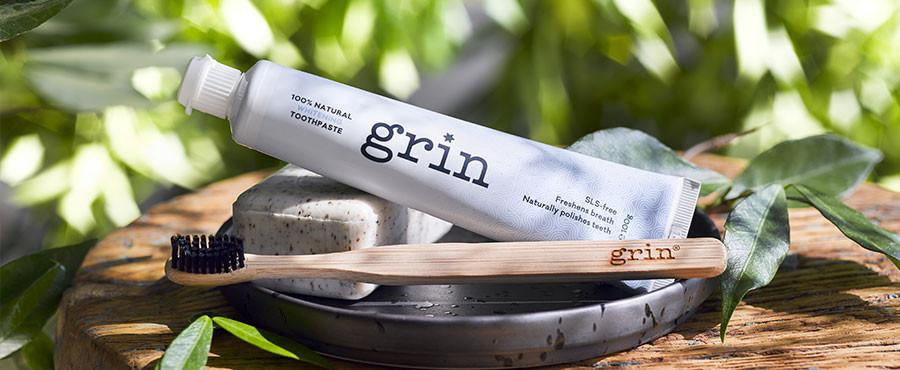
Why you should switch to a natural toothpaste
Share

Author: Renée Leonard-Stainton from Renée Naturally. Qualified Naturopath, Nutritionist, and Western Medical Herbalist.
Brushing teeth twice daily is a healthy habit that most New Zealanders can pat themselves on the back and say they get right. Maybe we haven’t got our exercise routine sorted (or even started!), and perhaps the idea of daily green smoothies doesn’t put a smile on our dial. But if all else fails, we can be confident we’re doing our body good by at least starting and ending the day with this one healthy habit. But is it really so good for us? Of course, the act of brushing is undeniably good for our pearly whites. However many kiwis are unaware of the potentially dangerous chemical cocktail that they may be coating their highly absorptive mouths with on a daily basis by way of conventional toothpaste. Gulp. If the thought leaves a bitter taste in your mouth, read on to learn some of the specific ingredients to avoid, and most importantly the no-nasties naturally healthy ways to keep your teeth and body in chipper health!
Firstly, it’s important to understand how incredibly permeable and absorptive the mucosal lining of your oral cavity (your mouth) really is. So much so, that when people aren't able to absorb nutrients through their diet or even via supplementary tablets, they’re often prescribed sublingual vitamins (absorbed under the tongue) for fast uptake by the bloodstream. It’s like a gateway for all nutrients (or toxins!) to enter all systems and organs in our body. So naturally, while we don’t swallow toothpaste (OK, maybe a little if we don’t bother rinsing!), potentially toxic ingredients in our toothpaste can still inadvertently make their way into our body and wreak havoc on our health.
Here’s an overview of 4 of the most controversial ingredients in conventional toothpastes and why you may like to avoid them…
Triclosan - is an antibacterial chemical added to toothpaste to help fight plaque and gingivitis. However, triclosan has also been linked to concerns over antibiotic resistance, endocrine disruption and thyroid dysfunction.
Sodium Lauryl Sulfate (SLS) Sodium lauryl sulfate, sodium laureth sulfate (SLS) and sodium lauryl ether sulfate (SLES) - are surfactants responsible for the foaming action of the toothpaste. SLS has been linked to skin irritation and painful canker sores.
Aspartame and other artificial sweeteners - are also often added to commercial toothpaste. Aspartame is metabolized inside your body into both wood alcohol (a poison) and formaldehyde (which is a carcinogen). Aspartame consumption has been linked to birth defects, cancers, brain tumors and (ironically) weight gain. Saccharin is another artificial sweetener used to sweeten many kinds of toothpaste and mouthwashes and should also be avoided for similar reasons.
Artificial Preservatives (tetrasodium EDTA, Parabens etc - are preservatives sometimes used in toothpastes that have been linked to harmful health effects. Parabens are endocrine-disrupting chemicals that mimic the hormone estrogen, and exposure has been linked to and developmental and reproductive toxicity.
Natural toothpaste brands don’t contain the above harmful ingredients, and instead contain beneficial herbs and ingredients such as:
Manuka oil - antibacterial properties
Organic sea salt - antibacterial and soothing
Spearmint - helps to keep mouth and gums clean
Calendula oil -antioxidant and antimicrobial compounds
Aloe leaf - helps to clean teeth and eliminate cavity-causing bacteria
Sodium bicarbonate -helps to naturally remove stains and discoloration from the teeth
Propolis - has powerful antiseptic properties that help to keep the mouth healthy
Also, don't forget that your diet is the foundation for strong, healthy teeth. Nutrients that are particularly important for oral health include:
- Vitamins C, D, and K2 (found in citrus fruits, egg yolks, chicken breast)
- Magnesium (found in whole grains, green leafy vegetables)
- Phosphorous (found in meat, beans, and dairy)
- Potassium (found in sweet potatoes, bananas, potatoes)
- Calcium (found in yogurt, kale, sardines)
Taking steps to ensure that your oral hygiene products are as toxic-free as possible can greatly influence your general health. This is only a very brief look into the potentially toxic ingredients in toothpaste so I encourage you to do your own research and ideally, look for a toothpaste that's complete with natural ingredients! It’s not only your pearly whites that can benefit from using a natural toothpaste; It’s your whole body.
About the Author: Chronically ill from the age of 11 with a debilitating immune disorder, Renée was bedridden for many of her teenage years while being subject to endless medical tests and specialist visits. Her eventual discovery of natural medicine saw her, in time, regain her full health and vitality. This life changing experience fueled her desire to become a Naturopath and has seen her now help others on their journey to wellness, naturally.
As a qualified Naturopath, Nutritionist, and Western Medical Herbalist, Renée is working with a growing list of clients around the world, from her home country in New Zealand across Australasia, to the States and the Middle East. Her international natural health career has exposed her to many cultures and medicines, and she is now a sought after Naturopathic advisor and brand ambassador for various companies in both the retail food and health supplement categories. Visit Renée's website: http://www.reneenaturally.com/
